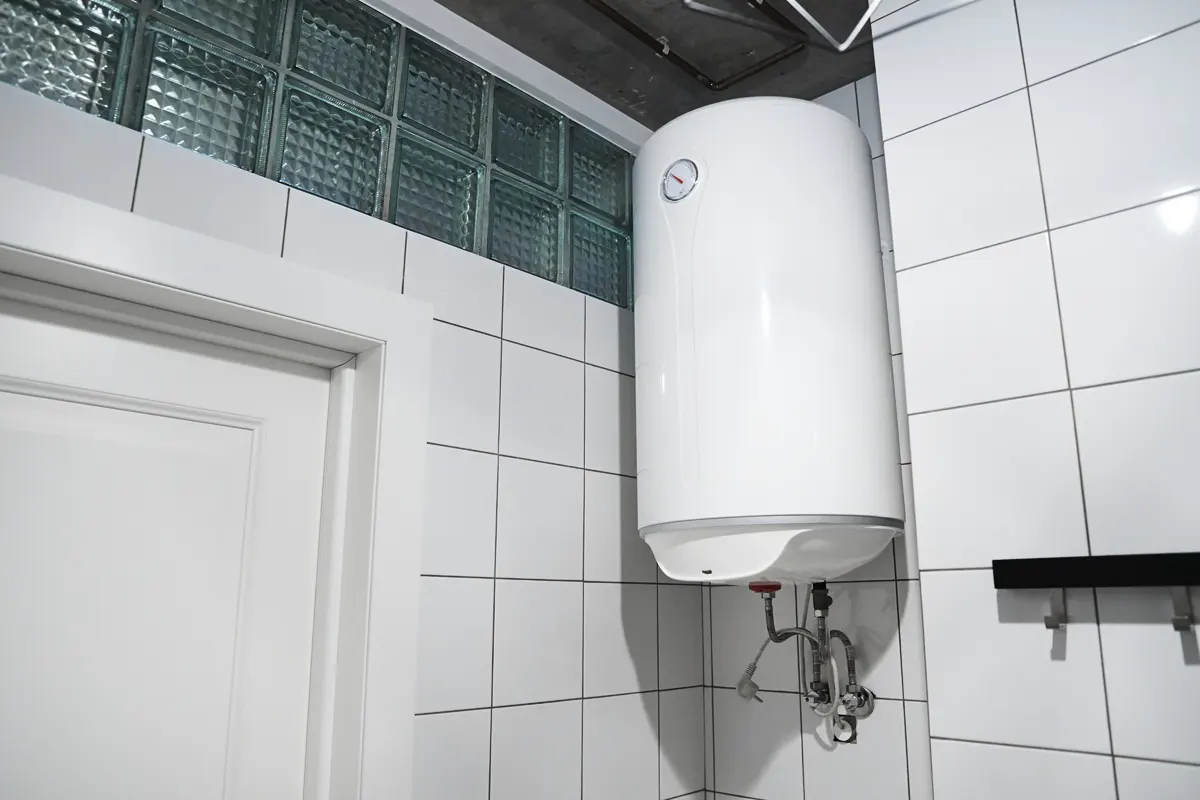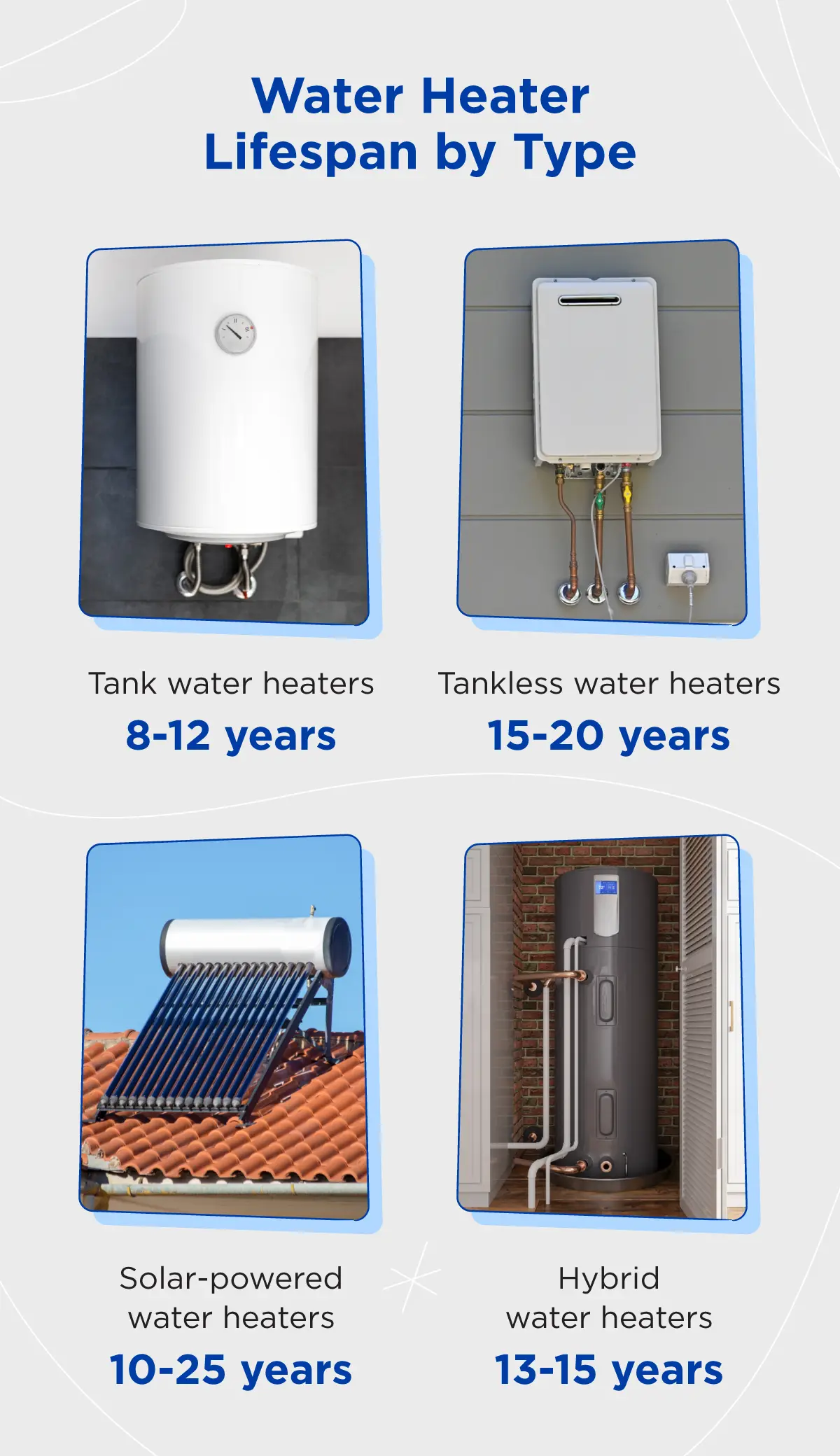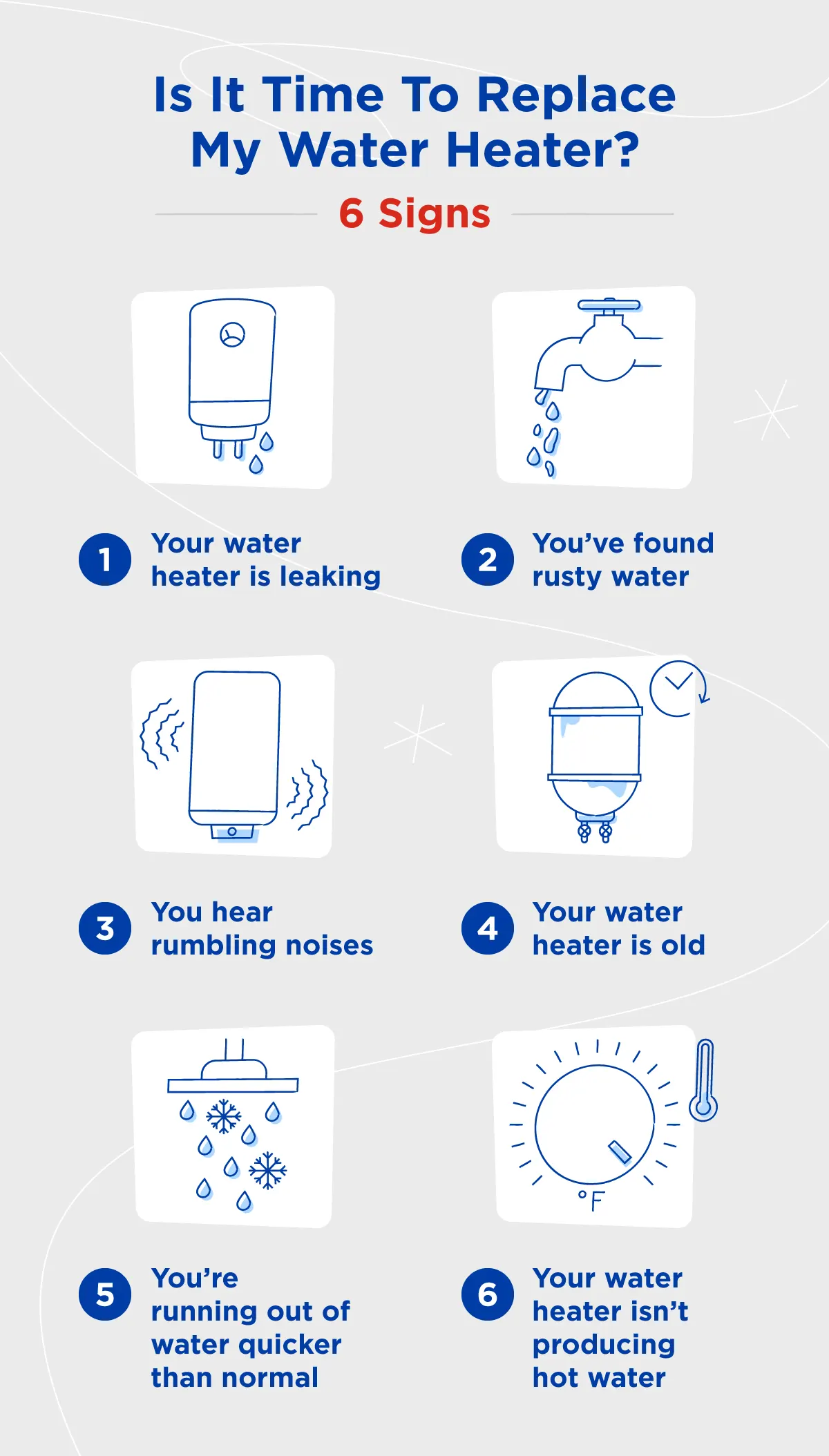
Water heaters typically last an average of eight to 12 years with proper maintenance and upkeep, but their lifespan can differ depending on the type of water heater you have. Whether you have a traditional or tankless water heater, they’ll eventually need to be replaced.
Below, we’ll cover the average lifespan of water heaters by type and common water heater problems that may indicate that your system needs replacement.
Average Water Heater Lifespan

A water heater's lifespan can vary depending on the type of system.
- Tank water heaters can last an average of eight to 12 years.
- Tankless water heaters can last an average of 15-20 years.
- Solar-powered water heaters can last an average of 10-25 years.
- Hybrid water heaters can last an average of 13-15 years.
Aside from the type of system you have, the age and the quality of your unit can impact the longevity of your water heater. This is why proper water heater maintenance is key to extending its lifespan.
6 Signs Your Water Heater May Need To Be Replaced
Several signs could indicate that your water heater needs replacement. If you’re experiencing any of the following problems, it's best to consult a professional plumbing company to diagnose the issue and determine whether or not you need a water heater replacement.
1. Your water heater is leaking
Risk level: High
A leaking water heater is a telltale sign that something is wrong. A myriad of problems could cause a water heater to leak, like cracks within an old tank or corrosion and sediment buildup. It’s important to diagnose the source of the leak and act fast because if a leak goes undetected, it can lead to larger problems, like mold growth and damaged property.
If you notice smaller leaks coming from the pressure relief valve or the drain valve, you may be able to fix it with a simple part replacement. However, if you notice leaks coming from the tank itself, it could be from sediment buildup and corrosion.
The fix: Have a service professional determine the source of the leak and if it’s accompanied by any other issues, like rusty water or an outdated tank. If there are no other issues, consider replacing the faulty part. If the leak is originating from the tank, replacing the water heater may be the safest and most reliable solution.
2. You’ve found rusty water
Risk level: High
If you’ve noticed rusty or discolored water around your water heater or dripping from a faucet, it can indicate deterioration inside your tank. Not only can this contaminate your water supply, but the corrosion can weaken your tank, causing it to crack and leak. However, rusty water can also indicate corrosion within your home’s pipe system.
The fix: Before you consider replacing your water heater, contact a service professional to help diagnose the source of the rusty water and determine the best course of action. If the rust is coming from your water heater, replacing it might be the most reliable and cost-effective solution.
3. Your water heater is old
Risk level: High
Even if you haven’t noticed any concerning signs and your water heater is over eight to 12 years old, it might be time to consider a replacement. If you wait too long, it could lead to other issues or unexpected failure.
To determine how old your water heater is, look at the water heater warranty or the label on your tank for the manufacture date. If you don’t see a date included, do an online search using the brand name and serial number. Each water heater brand has specific instructions on decoding the date using the serial number.
The fix: Consider replacing your water heater to avoid other issues that could cause water damage and potential safety hazards.
4. You hear a rumbling noise
Risk level: Medium
Popping, rumbling, and gurgling sounds coming from your water heater are often a sign of sediment buildup. Over time, the minerals in your water supply accumulate and settle at the bottom of your tank. As the water heater turns on and off, it moves the sediment, causing the rumbling noise. If not flushed yearly, sediment buildup can reduce efficiency, leading to higher energy bills and potential failure.
The fix: Drain your water heater to remove the sediment buildup. If you still hear the banging noises after you’ve flushed the water out, it could be a sign of another issue, like remaining buildup, a malfunctioning heating element, or loose components. Contact a service professional to diagnose the source of the noise and determine if repairs or a replacement is necessary.

5. Your water heater isn’t producing hot water
Risk level: Medium
No hot water can be an indicator that your water heater has reached its lifespan. However, it can also be linked to other things, like a tripped circuit breaker, faulty thermostat, broken heating element, or sediment buildup.
The fix: First, check the circuit breaker to see if the breaker for the water heater has tripped. If that’s not the issue, try adjusting the thermostat to a higher setting. Your water heater temperature should never be below 120 degrees. If the problem persists, contact a plumber to determine if you have a faulty part or need to replace your unit altogether.
6. You’re running out of hot water faster than usual
Risk level: Medium
Have you ever been in the shower for less than five minutes, and suddenly your water is lukewarm or even cold? Similar to no hot water, inconsistency in water temperature can signal a problem.
Sediment buildup can reduce a system’s hot water capacity, which can cause you to run out of hot water faster than normal. Or, if your water heater is too small and can’t keep up with the hot water demand in your household, it can deplete the hot water tank quickly.
The fix: Flush your hot water tank to eliminate sediment buildup or reduce your household hot water demand. If the issue persists and you’re experiencing other problems, call a plumber to determine if you have a faulty heating element, internal issues, or need to replace your unit.
When Should You Replace a Hot Water Heater?
Repair may be an option in some cases, but replacing your water heater might be the smartest option if it’s nearing the end of its lifespan.
You may also consider replacing your water heater if:
- You’ve flushed your water heater and are still hearing rumbling noises
- There’s rust in or around your water heater tank
- Your water heater is no longer producing sufficient hot water after checking the thermostat and circuit breaker
- Your water heater is leaking and you’ve confirmed the source of the leak isn’t coming from other parts, like the pressure relief valve or the drain valve
Call Mr. Rooter Plumbing for Water Heater Maintenance and Repair
Proper upkeep and maintenance are crucial to extending the longevity of your water heater. However, all water heaters are bound to give out at some point. Whether you need water heater maintenance assistance or are experiencing concerning issues, Mr. Rooter Plumbing® is here to help. Our skilled service professionals can diagnose problems, replace parts, and help you decide on the perfect water heater replacement for your home.
Give us a call or schedule an appointment online to see how we can help.
How Long Do Water Heaters Last? FAQ
Still wondering how long your water heater will last and if it’s time to replace yours? Below are answers to some common questions regarding a water heater's life expectancy and signs that it may be time for a new one.
Can a hot water heater last 20 years?
Tankless and solar-powered water heaters typically have a lifespan of over 20 years. If you have a conventional tank water heater, the typical lifespan is eight to 12 years. However, with proper upkeep and maintenance, you may be able to extend its lifespan. For example, installing a water softener or using a lower temperature setting can contribute to a water heater's longevity.
Should I replace a 15-year-old water heater?
Replacing a water heater that’s 15 years old depends on the type of water heater and its condition. Most conventional tanks last up to 12 years, though you can extend the life expectancy of a water heater with proper upkeep.
If you’re nearing the 15-year mark and have a traditional water heater, consider upgrading your unit with a new one. If you have a 15-year-old tankless or solar-powered water heater, you might have a few years left before you’ll need to replace it.
How do I know when my water heater is going out?
Several signs may indicate a failing water heater, including:
- Old age, typically older than eight to 12 years
- Rusty water or rust around the tank
- Gurgling or popping sounds coming from the unit
- Visible leaks coming from the water heater
- Fluctuations in water temperature
- Inability to produce hot water

